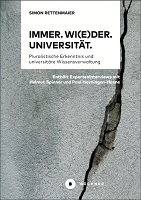Immer. Wi(e)der. Universität.
Pluralistische Erkenntnis und universitäre Wissensverwaltung
Abstract
This book is a successful attempt to reflect on science policy necessities against the background of an ideal epistemology of universities. The result is an analysis that compares the peculiarities of the university organization with the ideal of the university and uncovers noticeable contradictions. Rettenmaier examines the construct of the university as a place of knowledge and cognition as well as a place of social education from its historical understanding to the present. In the university - understood as a large-scale enterprise in Max Weber's sense - organizational concerns are confronted with institutional-epistemological concerns. In terms of the theory of science, the analysis is based on the philosophers Paul Feyerabend and Helmut Spinner; in addition, the organizational-sociological objections are pointed out with David Graeber's considerations. In the end, a plea is made in favor of a science policy and university bureaucracy that reflect the theory of science, while at the same time warning against an exuberant competitive economy that is critical of capitalism.
Keywords
humanism; philosophy of science; Helmut Spinner; Humboldt; bureaucracy; Niklas Luhmann; David Graeber; Max Weber; Paul Hoyningen-Huene; Paul Feyerabend; pluralism; monopoly pluralism; philosophy of science; research; university; teaching; university; science; science system; education; Wissenschaftszeitvertragsgesetz; #IchBinHanna; university policy; WissZeitVGDOI
10.14631/978-3-96317-912-9ISBN
9783963173530, 9783963179129Publisher
Büchner-VerlagPublication date and place
2023Classification
Philosophy of science
Higher education, tertiary education
Philosophy and theory of education
Educational strategies and policy
Science funding and policy
Scientific research


 Download
Download Web Shop
Web Shop